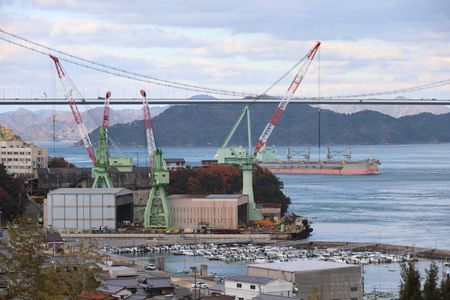Japan Proposing Shipbuilding Cooperation in U.S. Tariff Talks
Japan Proposes Shipbuilding Cooperation with U.S.

Tokyo, May 12 (Jiji Press) — In a strategic move during tariff negotiations, the Japanese government is advocating for a partnership with the United States in the shipbuilding sector. This initiative comes as the U.S. aims to revitalize its shipbuilding industry to better compete with China’s significant market dominance. Japan is leveraging this proposal as a potential bargaining tool to negotiate concessions on automotive tariffs and other trade issues.
Japan’s Strategic Approach in Tariff Negotiations
As part of its ongoing discussions with the United States, Japan is focusing on enhancing cooperation in shipbuilding. This approach aligns with the U.S. administration’s efforts to bolster its shipbuilding capabilities, which have been overshadowed by China’s substantial market share. According to Japan’s 2024 white paper on land, infrastructure, transport, and tourism, China accounted for nearly 49% of the world’s new ship construction in 2023, while South Korea followed with 28.5%, and Japan held a 15.6% share. The United States, once a leader in this industry, now finds itself lagging significantly behind.
India to impose up to 30 per cent tariffs on some steel imports from China, Vietnam
In light of these developments, the U.S. government has expressed concerns regarding the decline of its shipbuilding industry, citing potential national security implications. To address this issue, Washington is looking to collaborate with allies like Japan and South Korea to revitalize its shipbuilding sector. By proposing technical assistance in shipbuilding, Japan hopes to strengthen its negotiating position on various trade matters, particularly automotive tariffs, which have been a point of contention in U.S.-Japan trade relations.
Implications for U.S.-Japan Relations
The proposed shipbuilding cooperation could have far-reaching implications for U.S.-Japan relations. If successful, this partnership may not only enhance the competitiveness of both nations’ shipbuilding industries but also foster deeper economic ties. Japan’s willingness to assist in revitalizing U.S. shipbuilding could be seen as a gesture of goodwill, potentially paving the way for more favorable trade agreements in other sectors.
As the negotiations progress, both countries will need to navigate complex trade dynamics and address each other’s concerns. The outcome of these discussions could significantly influence the future of international trade relations, particularly in the context of growing competition from China. With both nations recognizing the strategic importance of a robust shipbuilding industry, the proposed cooperation may serve as a critical step toward strengthening their economic partnership.
